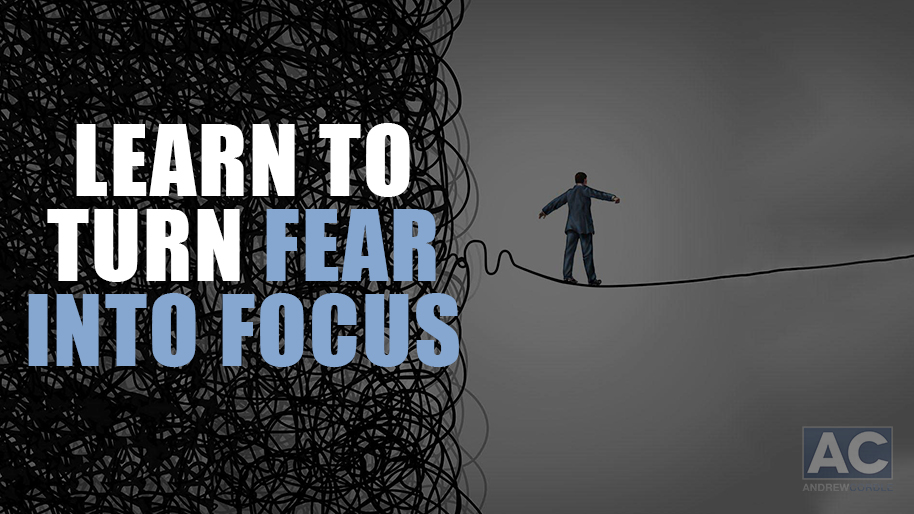Learn to Turn Fear into Focus!
December 16, 2014

James Stockdale is best known in recent decades as the vice presidential candidate in Ross Perot’s failed bid for the White House back in 1992. But what he is best known for is his surviving over seven years of daily torture as a POW in Vietnam. He was shot down in 1965 and was ultimately released after negotiations in 1973. Stockdale once observed, “You have to practice hurting. One should include a course of familiarization with pain. You have to learn to take a bunch of junk and accept it with a sense of humor”.
But survival is not about being a hero. Author Laurence Gonzales writes, “Survival is not about bravery and heroes. By definition, survivors must live. Survivors aren’t fearless. They use fear – they turn it into anger and focus.” He continues, “A lifetime of experience shapes us to meet or be crushed by such challenges as a bad divorce, the shattering of a career, a terrible illness or accident, a collapsing economy, a war, a prison camp, the death of a loved one, or being stranded in a jungle”.
So now, let’s see if we can discern some ways to build that familiarization with pain and thus survive:
First, one of the most potent survival truths is this: Find another person trying to survive and help them to safety. Helping another removes one from the self-focus of fear, pity, and pain. You move from being a victim to being a rescuer and that helps focus your energy on a plan to get you out of your own deep woods. It’s the old adage, “if I push your car to the top of the hill with my car, my car gets to the top of the hill as well”. Gonzales later states, “Doctors and nurses often survive better than others because they have someone to help”.
We certainly may not feel like helping another when we are suffering our own pain, but it will actually help relieve a significant portion of our pain if we help another with theirs. Living a life of helping others by pausing our own journeys to play the good Samaritan role may be a true life-saving habit. Emergency conditions usually bring out the person that we have been becoming all along. A selfish “me-first” attitude will only stunt our survival chances, whereas an others first attitude could give us the right attitude in a crisis to survive it.
Secondly, survivors must find a purpose in their survival. Quite often, that purpose is living for someone they deeply love. During the crash of 2008, a close friend went through a terribly dark depression. It was a darkness that enveloped him each morning and suffocated light and life out of him all day. After months of mentally chasing his tail as a dog does his own, he was fatigued from attempting to recover. In a time of great despair, he did what many do. He chose to think that he was of no value to anyone and that death may end the pronounced pain of depression.
He put a gun to his head, cocked the hammer, and began squeezing the trigger. But then an image of his little son discovering his dead father with his brains splattered on the wall brought a tug from deep within. He had to live for him. He would need his father. That day, a 4-year-old boy gave a lost soul the purpose he needed to begin recovery. My friend didn’t leave his “woods” for another year after that, but that day he chose to find a way out!
Finally, learn to be aware. Here are some tips to help you begin today:
1. Be more aware of your life’s journey than your destination goals. Be “present” today.
2. Practice closing your eyes and learn to increase your hearing and other senses’ awareness. This can help you become a better listener as well, which in business and marriage can spell survival.
3. Practice what JFK said to his wife. “Walk slowly through the crowd”. Take it all in, notice the smiles and frowns; the sights and the sounds.
4. Practice being comfortable alone. So much of surviving in life involves one’s ability to be comfortable alone. Widowhood, divorce, losing one’s parents or children, military spouses, going off to college, etc. Many of these circumstances rise or fall to the level of tolerable or terrible relative to one’s comfort level of being alone with oneself.
5. Know what you can control and what you can’t control. Survival very much depends on exercising control over what you truthfully can control. When we are not aware of this principle, we waste energy and time trying to control others, circumstances, the weather or financial markets. That only wears us out in frustration and anger. As Art Williams of A.L. Williams and Associates says, “All you can do is all you can do, but all you can do is enough”.
6. Learn to stop, observe, listen, and analyze before taking the next step. That’s good advice for business, home, finance and survival.












